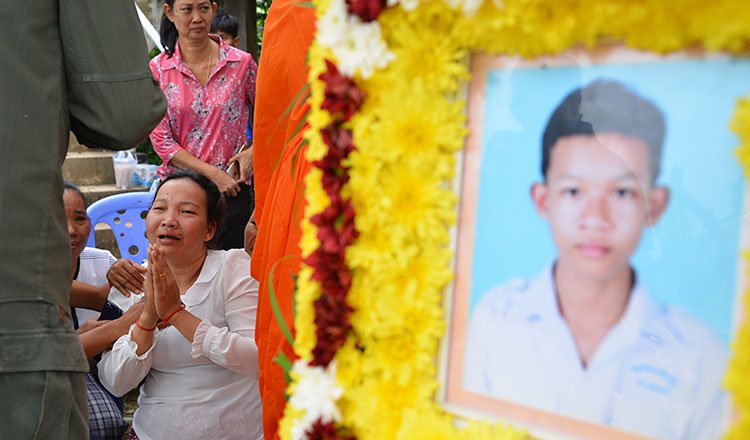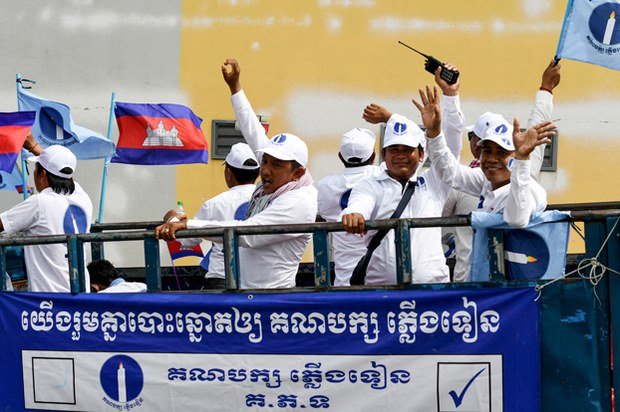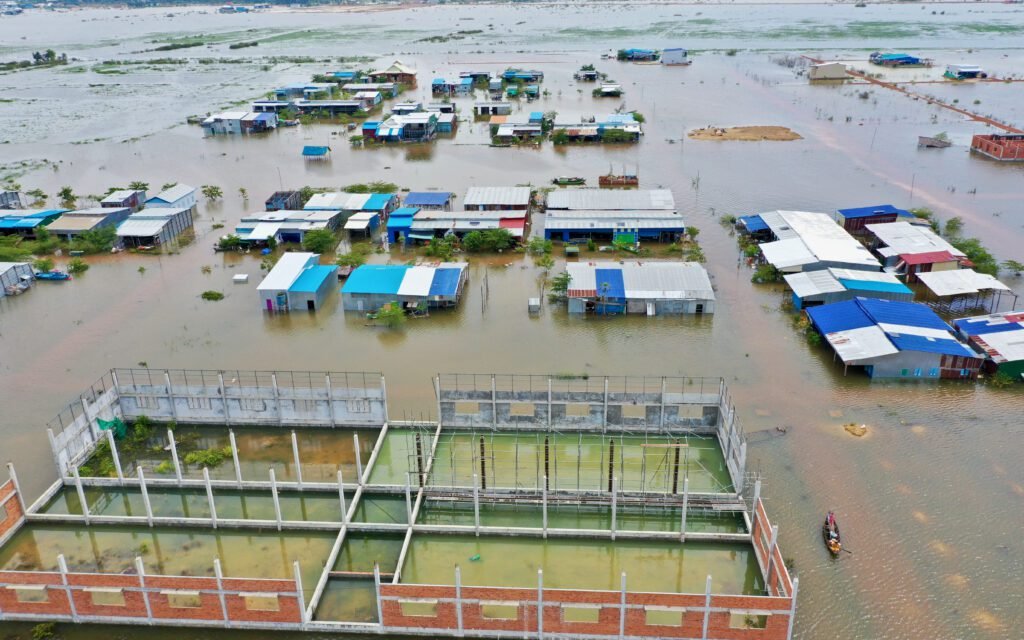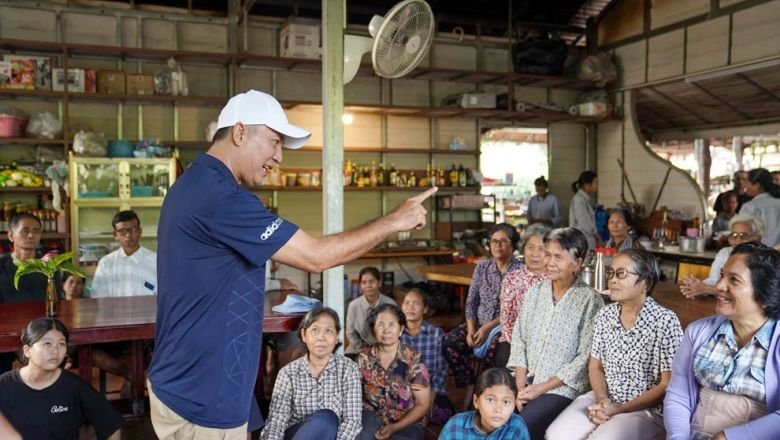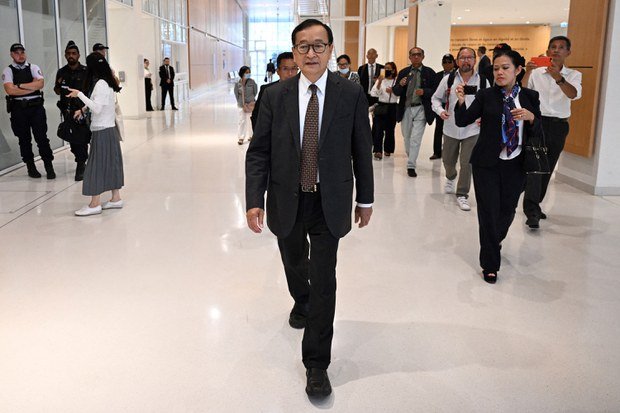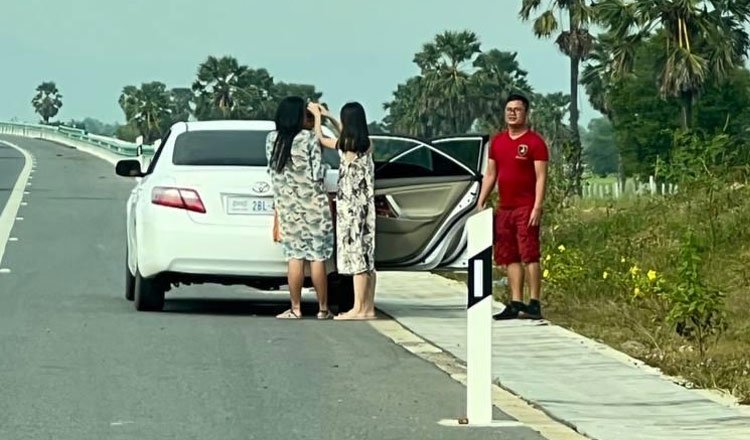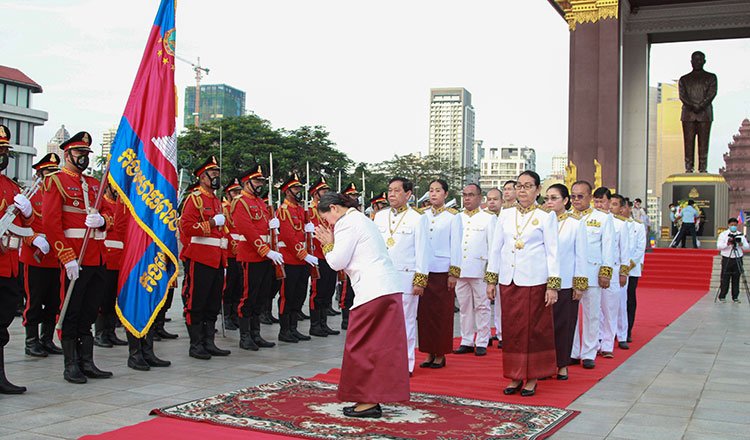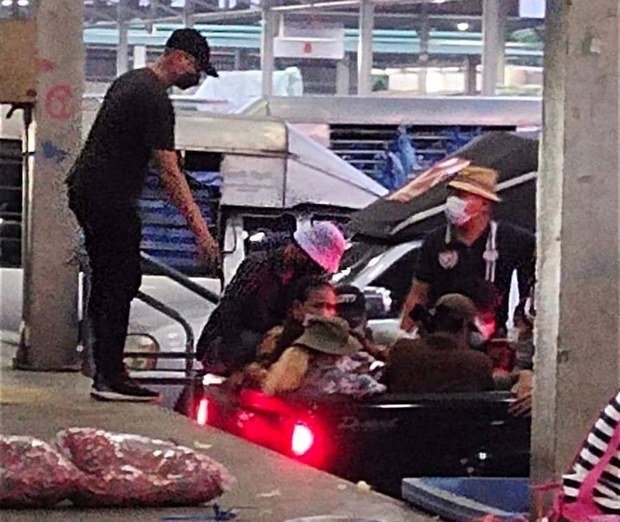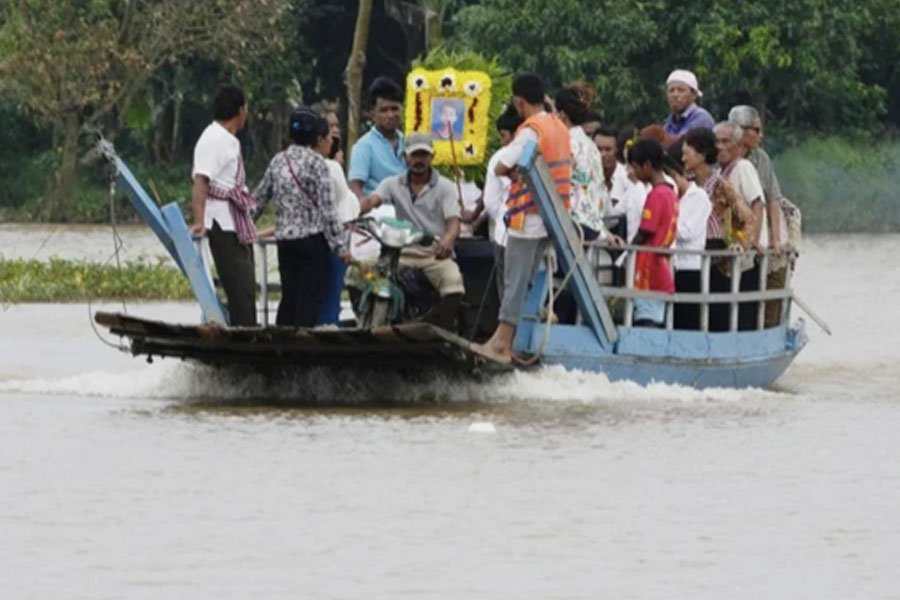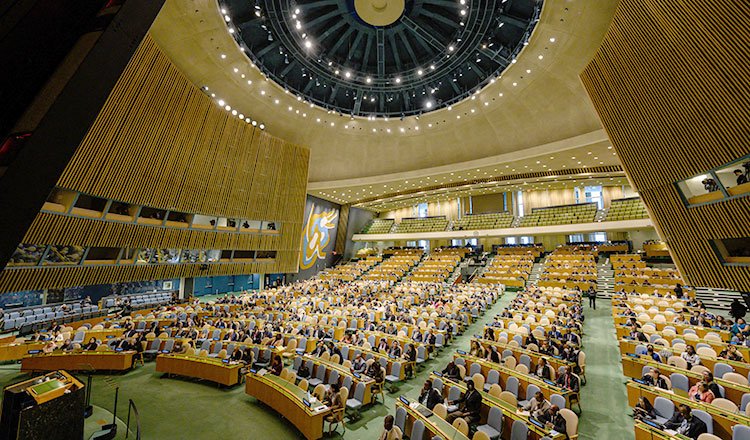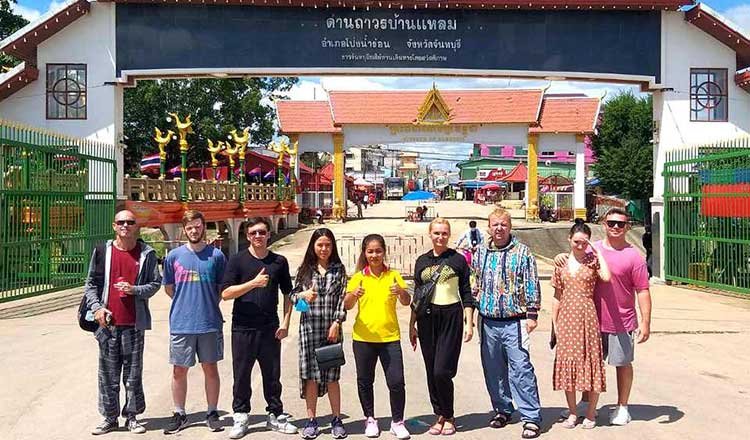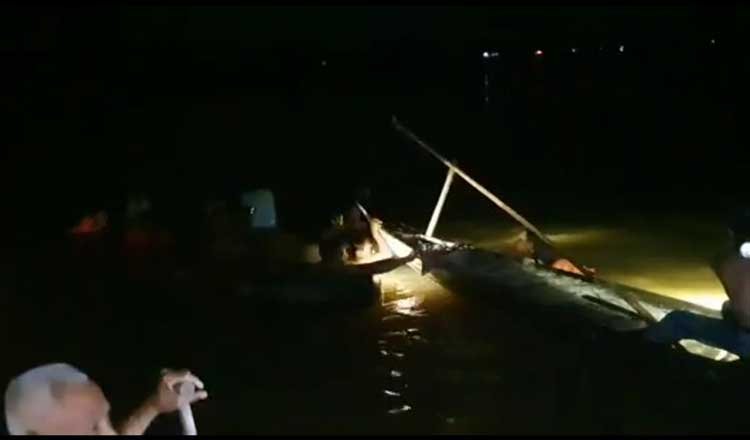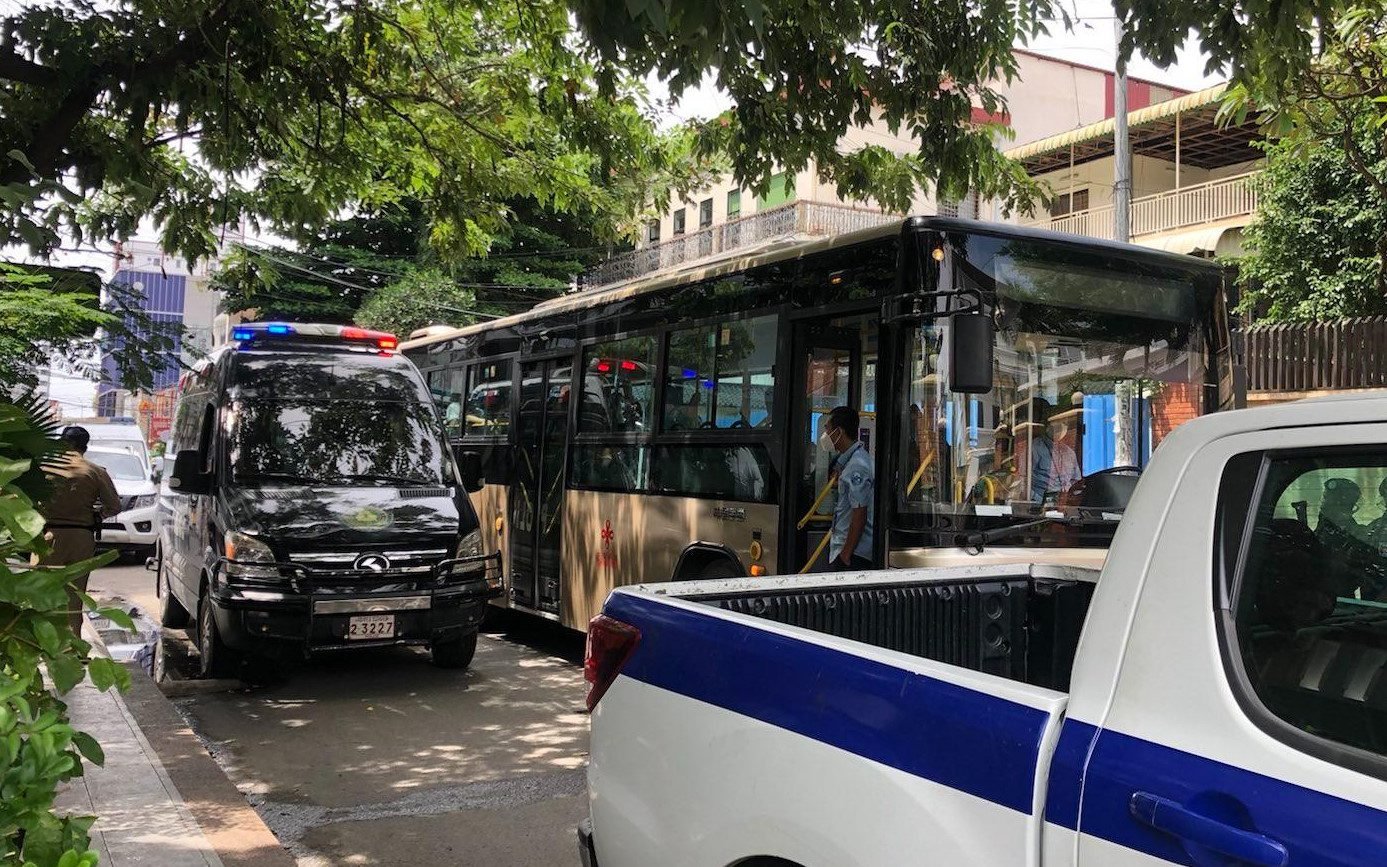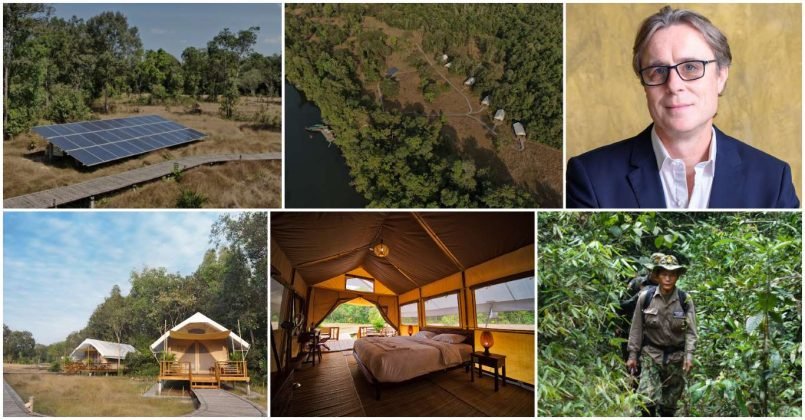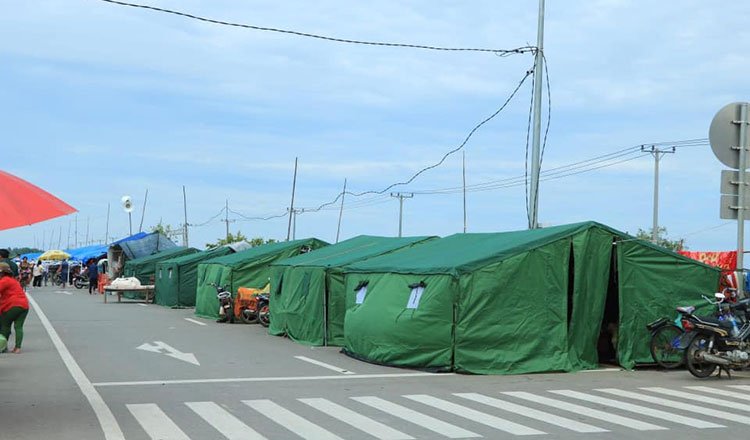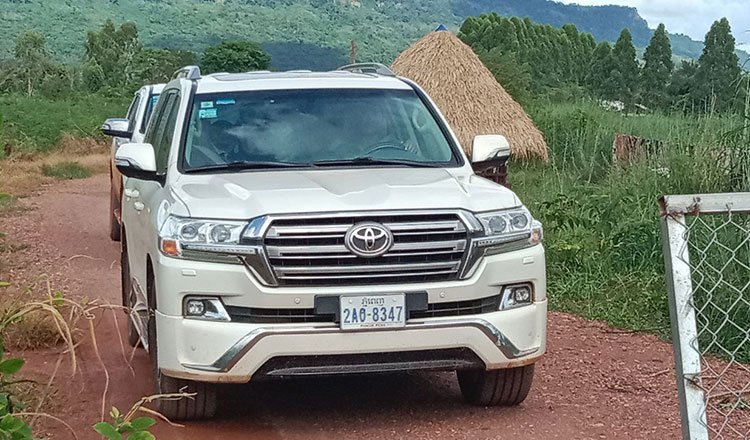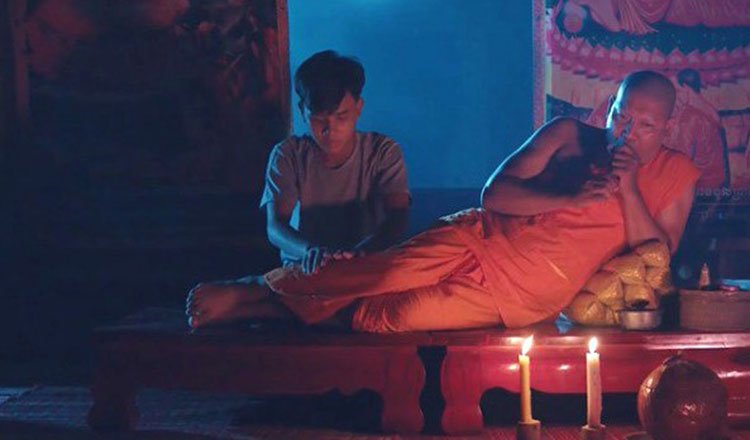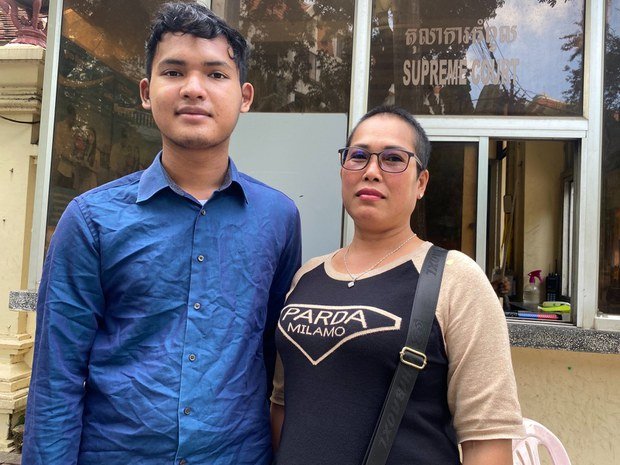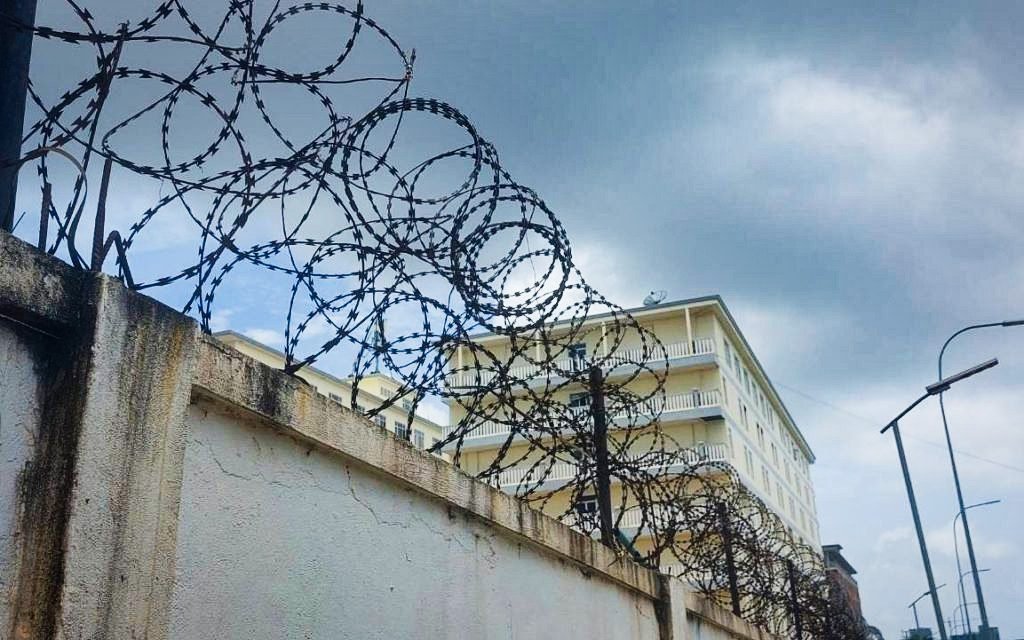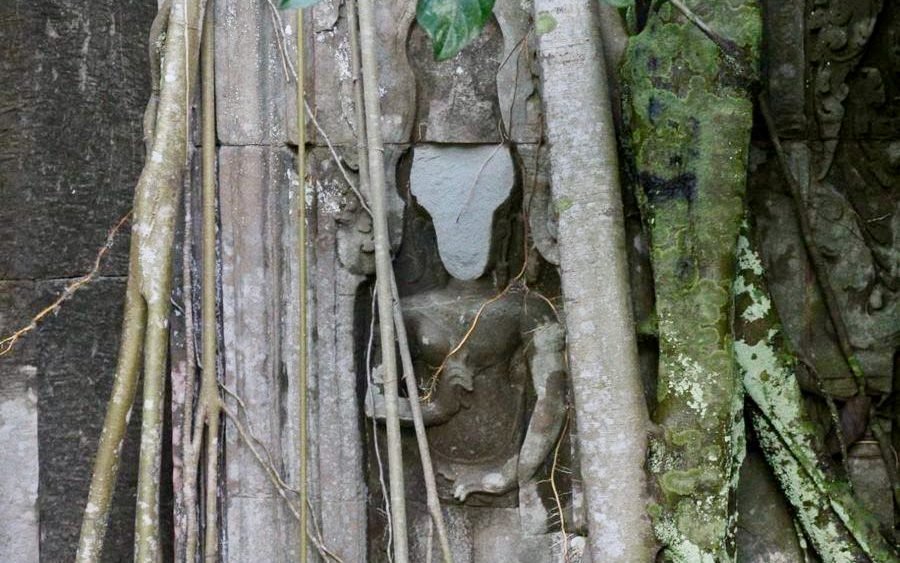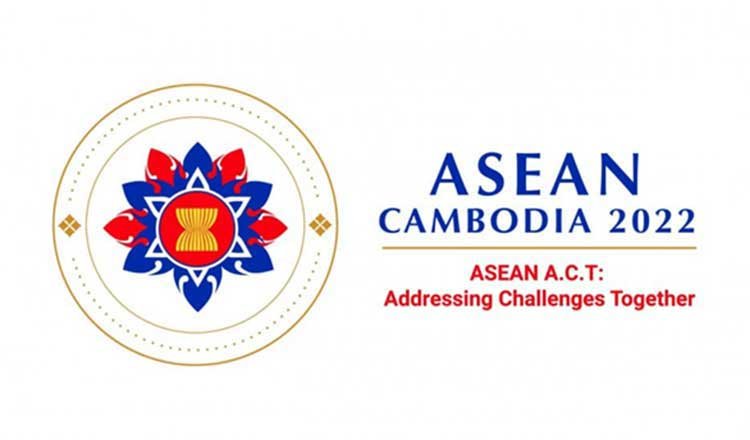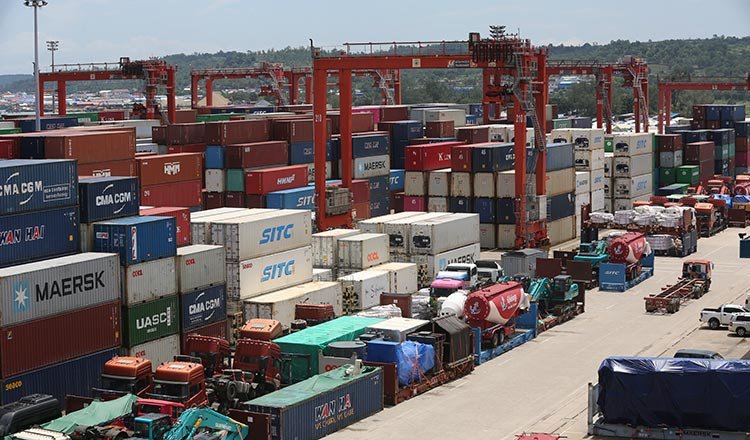-
Posts
15,789 -
Joined
-
Last visited
Content Type
Events
Forums
Downloads
Quizzes
Gallery
Blogs
Everything posted by geovalin
-
Civil society organisation officials have urged the government to show greater responsibility in the boating tragedy which claimed 11 children’s lives in Kandal’s Loeuk Dek district. Am Sam Ath, spokesman for the Cambodian League for the Promotion and Defence of Human Rights (LICADHO) said the government must be held accountable for the death of the children because the relevant officials did not do their job properly. “A governmental institution is responsible for licensing and monitoring boating operations in the country, and it should not allow any operation to carry on if they find that the boat has a problem.” “The local authorities must be held responsible because part of their job is to ensure the safety of the people, both on land and water,” he said. He said he hoped the tragedy will serve as a big lesson for the government and will trigger positive changes. Plan International Cambodia deputy country director Yi Kimthan said what happened to the children in the boat tragedy in Kandal province was a violation of children’s right to living and protection. read more https://www.khmertimeskh.com/501170625/responsibility-for-kandal-tragedy-lies-with-govt/
-
Widow also wants justice, and urges police to arrest suspect who shot dead her husband. The wife of a slain supporter of Cambodia’s Candlelight Party said Tuesday she has rejected a compensation offer of U.S. $7,000 from the alleged assailant in exchange for dropping the criminal case, but has said she would consider accepting a larger sum because she doesn’t have money for her husband’s funeral. Wen Kimyi also urged police to arrest the suspect who shot dead her husband, 49-year-old Po Hin Lean, early in the morning of Oct. 16 while he was on his way to go fishing. She told RFA that police in Ou Reang Ov district of Chak commune in Tbong Khmum province, where her family lives, summoned her to the police station and told her that the suspect offered to pay her if she would drop charges. The widow said she wants the money, but that her family also wants justice. “The police said there were two suspects, one of whom had the gun that killed him,” Wen Kimyi said. “I didn’t get a chance to see the suspect to ask [the reasons]. I will accept the compensation because I don’t have money for the funeral. But I won’t accept $7,000; I will need $15,000.” Police told her that the suspect is a “security guard” or “neighborhood watchman” for the commune, but declined to disclose where he put the weapon or his motive for the shooting. Cambodia’s Ministry of the Interior established a network of such local guards to provide security to villagers in communes and districts, though they are not supposed to carry weapons. RFA could not reach Vong Sophy, the police chief of Ou Reang Ov district, or On Sam On, police chief of Chak commune for comment on Tuesday. 'Embarrassing for the authorities' Leng Seng Han, a provincial coordinator for the Cambodian Human Rights and Development Association, also known as ADHOC, said the murder cannot be resolved through compensation and that the suspect must be brought to justice. “It is wrong for [police] to be involved in meditation outside the court,” he said. Eng Sroy, a Police Academy lecturer and president of the Candlelight Party working group in Tbong Khmum province, said he is dismayed that authorities have not yet apprehended the suspects and urged them to conduct a transparent investigation to show they are providing good security. “It is embarrassing for the authorities if they can’t arrest the suspects,” he said. “The authorities must differentiate between black and white and remain neutral during the investigation.” There have been numerous physical attacks this year on activists and supporters of the Candlelight Party, an opposition party that emerged from the ashes of the opposition Cambodian National Rescue Party (CNRP), which was banned and dissolved by Cambodia’s Supreme Court in November 2017. This April, Candlelight Party candidate Khorn Tun was attacked by unidentified men who threw rocks at her home in Tbong Khmum province during the campaign period for local elections held in June. Prak Seyha, a party youth leader for Phnom Penh’s Kamboul district, was attacked and beaten by a mob. Those incidents followed the death of Phnom Penh Candlelight candidate Choeun Sarim, who was attacked from behind and killed in traffic while riding a motorbike, following threats and assaults. The killing of the man in this case, Po Hin Lean, came a day before Prime Minister Hun Sen threatened to arrest Sam Rainsy, head of the banned CNRP, who has lived in exile in France since 2015, if he returns to Cambodia. Sam Rainsy, 73, was sentenced in absentia in March 2021 to 25 years in jail for what supporters say was a politically motivated charge of attempting to overthrow the government. Hun Sen, who has ruled Cambodia since 1985, made the comment at a graduation ceremony where he spoke, in response to recent remarks by Sam Rainsy criticizing the strongman’s plans to appoint his son, Hun Manet, as his replacement. Translated by Samean Yun for RFA Khmer. Written in English by Roseanne Gerin https://www.rfa.org/english/news/cambodia/opposition-widow-10182022173945.html Copyright © 1998-2020, RFA. Used with the permission of Radio Free Asia, 2025 M St. NW, Suite 300, Washington DC 20036.
-
Latest submissions Cambodia: Return To Seoul (Davy Chou) Inspired by the director’s own life as a French-born Cambodian, the country’s 11th Oscar submission follows a French woman who returns to Korea for the first time since being adopted as a baby. The film had its world premiere at Cannes in Un Certain Regard and also screened at Busan, Zurich, New York, Toronto, and Athens, where it won best picture. Return To Seoul stars Park Ji-Min in the lead and the rest of the cast includes Oh Kwang-Rok, Kim Sun-Young, Guka Han, Yoann Zimmer and Louis-Do De Lencquesaing. It was produced by France’s Aurora Films in co-production with Cambodia’s Anti-Archive, Germany’s Vandertastic Films and Belgium’s Frakas Pictures. Sony Pictures Classics is distributing the title in the US, Latin America, Middle East, Australia, and New Zealand. Cambodia’s only nomination so far is 2013’s The Missing Picture by Rithy Panh. International sales: mk2 read more https://www.screendaily.com/news/oscars-2023-cambodia-selects-cannes-title-return-to-seoul/5173253.article
-

Thai Cabinet approves ฿6.6bn for two new bridges in the South
geovalin replied to snoop1130's topic in Krabi News
On all the maps I have looked at, the bridge between Lanta and Lanta Noi already exists. Am I wrong ? The new bridge would connect Krabi and Lanta Noi, right? -
by Keat Soriththeavy and Fiona Kelliher ROLEA BA’IER DISTRICT, Kampong Chhnang — Four years ago, Vuen Phouk Thoung was promised a plot of land in a new neighborhood and a garment factory job nearby. Now his home is submerged in floodwater so high he spends all day and night in a hammock suspended from the ceiling. “I don’t know what to do now,” said Thoung, 35, as he sat cross-legged on the wooden plank he constructed to swim in and out of his house. “I’ll just live like this, here.” Thoung lives on a 40-hectare site in Kampong Chhnang where about 150 ethnic Vietnamese families were relocated after being evicted from their floating homes on the Tonle Sap starting in 2018. Ethnic Vietnamese people number an estimated 400,000 in Cambodia, but many lack citizenship rights and are unable to own property or access public services, according to Minority Rights Group International. All around Thoung, houses were filled with dirty floodwater about 2 meters high. Children floated in rubber barrels, surrounded by piles of trash and in one case, a small dead animal. Families had rigged elaborate rope systems to keep their belongings safe on their second floors, but a motorcycle, children’s bikes and a ceiling fan were floating in the water anyway. read more https://vodenglish.news/sunken-village-after-evictions-ethnic-vietnamese-homes-underwater/
-
PHNOM PENH, Oct 17 (Phnom Penh Post/ANN): More than 1,000 followers of League for Democracy Party (LDP) president Khem Veasna, whose doomsday prediction drew thousands of his supports to his plantation in Siem Reap province to escape the purported apocalypse, have refused to leave, according to provincial police chief Teng Channath. Channath said such a mass gathering needs permission from the local authorities. “Entering the plantation is forbidden unless Khem Veasna, or an LDP representative, submits a letter seeking permission from the authorities,” he said, adding that the letter needs to state the reasons for the gathering in order to comply with the law on assemblies by political parties. He said the fact that Veasna’s supporters refuse to leave the plantation has prompted the authorities to implement measures to prevent new people from gathering there. Channath said authorities are not allowing any more people to enter the plantation because they need to maintain the wellbeing of children and the elderly who are living at the location already. read more https://www.thestar.com.my/aseanplus/aseanplus-news/2022/10/17/cambodia-over-1000-doomsday-believers-still-refuse-to-leave-siem-reap-plantation
-
Po Hin Lean was shot on his way to go fishing in the early hours Sunday. A supporter of Cambodia’s Candlelight Party was shot dead in Tbong Khmum province over the weekend, the latest in a series of attacks on the opposition in a year of local elections and campaigning for 2023 parliamentary voting, his wife and supporters said Monday. Candlelight Party’s vice-chairman Thach Setha told RFA that he could not yet conclude whether the killing Sunday of Po Hin Lean, a 49-year-old father of three, was a political assassination. He urged authorities in the province’s Orang Ov district to conduct a prompt investigation. “A clear investigation must be conducted to catch the perpetrators and bring them to justice, to stop such killing whether it happens to political activists or [ordinary] people,” said Thach Setha. Police chief On Sam On of Chak commune, where Po Hin Lean lived, refused to provide any details on the case when contacted by RFA Khmer. Orang Ov authorities were not available and provincial police chief Mon Meakara hung up the phone after receiving a call from RFA. "Who shot my husband?" asked Wen Kimyi, the victim’s wife. “The police officer said the village security guard was the shooter. I said it was not the village security guard who fired, because the village security guard did not have a gun. The policeman said he had a gun, so he did not talk to me further,” she added. This year has seen a rise in violent attacks targeting activists and supporters of the Candlelight Party, an opposition party that emerged this year from the ashes of the Cambodian National Rescue Party (CNRP), which was banned and dissolved by the country’s supreme court in 2017. In April, during campaigning for June local elections, Candlelight Party candidate Khorn Tun was attacked by unidentified men who threw rocks at her home in Tabaung Khmom province, while Prak Seyha — a party youth leader for Phnom Penh’s Kambol district — was attacked and beaten by a mob. Those incidents followed the death of Phnom Penh Candlelight candidate Choeun Sarim, who was attacked from behind and killed in traffic while traveling by motorbike, following threats and assaults. The latest attack came a day before Prime Minister Hun Sen threatened to arrest opposition leader Sam Rainsy, who has lived in exile in France since 2015, the moment he returns to Cambodia. Sam Rainsy, 73, was sentenced in absentia in March 2021 to 25 years in jail for what supporters say was a politically motivated charge of attempting to overthrow the government. Speaking at a graduation ceremony for students at a university in Phnom Penh on October 17. Hun Sun said he would “eliminate the three generations of the ideology of the contemptible traitor [Sam Rainsy]...but I will not kill you." Hun Sen, who has ruled Cambodia since 1985, was responding to recent remarks by Sam Rainsy criticizing the strongman’s plans to appoint his son, Hun Manet, as his replacement. “I believe there will be strong opposition to Hun Sen's transfer of power to his dynasty. We want a succession of young Cambodians who are capable and accomplished, but we do not want a succession of clans in a family that is above everyone else and that has the right to rule Cambodia forever, ” Sam Rainsy said in a video. Sam Rainsy and other exiled members of the CNRP have tried to return to Cambodia on several occasions. The acting CNRP leader tried to return on Nov. 9, 2019 to lead nonviolent protests against Hun Sen, urging Cambodian migrant workers abroad and members of the military to join him. However, his plan to enter Cambodia from Thailand was thwarted when he was refused permission to board a Thai Airways plane in Paris. Score of CNRP activists were arrested and jailed in the aftermath. “The CNRP is still determined to return to Cambodia as long as there is an opening from Hun Sen, but in fact he does not dare to open up the way for Sam Rainsy and CNRP leaders to return to Cambodia as he did in the past,” said Oum Sam An, a former CNRP lawmaker. Translated by Sok-Ry Som. Written by Nawar Nemeh. https://www.rfa.org/english/news/cambodia/opposition-death-10172022181913.html Copyright © 1998-2020, RFA. Used with the permission of Radio Free Asia, 2025 M St. NW, Suite 300, Washington DC 20036.
-
The Traffic Police and Public Order Department of the General Commission of the National Police has requested that citizens who use the new Phnom Penh-Sihanoukville Expressway refrain from taking selfies in the road, as this may cause accidents. Colonel Van Havari, deputy director of the Traffic Police and Public Order Department, who is in charge of the expressway, appealed to all people traveling on the expressway, to not stop to take pictures on the road for fear of accidents. He asked people to go to the parking lot at the rest area (Rest Area) and not to park in the emergency lane if they do not have an issue with their vehicle. The Colonel added that authorities helped people in need of emergency in three cases on October 15, 2022 He stated that the three cases involved engine problems and flat tires. read more + picture https://www.khmertimeskh.com/501169119/stop-taking-selfies-on-new-phnom-penh-sihanoukville-expressway-say-authorities/
-
Cambodians paid homage to King Father Norodom Sihanouk on Saturday, October 15, the 10th anniversary of his death. Ceremonies were held at memorials and statues dedicated to the man who was not only royalty but a statesman first and a politician second. King Father Sihanouk is highly respected and revered for his sacrifices for the Kingdom, Prime Minister Hun Sen took to his Facebook page on Saturday to express his “sincere gratitude” to the late king who died aged 91 of natural causes in Beijing. Mr Hun Sen said he will never forget the sacrifices of the late King Father for “the nation and neither will Cambodian people of all walks of life”. “October 15, 10 years ago, was the saddest time for the whole Cambodian nation, because it was the time of the loss of one of the great kings, His Majesty King Norodom Sihanouk,” Mr Hun Sen said. At the Royal Palace, King Norodom Sihamoni and Queen Mother Monineath Norodom Sihanouk conducted a Remembrance Day ceremony to honour King Father Sihanouk. read more https://www.khmertimeskh.com/501169267/kingdom-pays-tribute-to-king-father-norodom-sihanouk/
-
Up to 12 refugees with UN status were detained at a market, accused of illegal entry to Thailand. Thai immigration police on Friday arrested as many as 12 Khmer Krom refugees found working illegally in Thailand, taking them to a detention center for processing and trial for entering the country without permission, sources told RFA. The group, including seven men and five women, were taken into custody at a vegetable market in Pathum Thani province, north of Bangkok, said another member of the ethnic minority group who escaped arrest because she had arrived late for work. “I got there about five minutes late — otherwise I would also have been detained,” the woman, who only gave her name as Chanthy, said, adding that when she arrived she saw four uniformed Thai police officers put the 12 refugees into a police van and take them away. However, an immigration officer said there were only 10 detainees – five Vietnamese nationals and five Cambodian nationals – who were arrested and charged with illegal entry, overstaying their visa or working without a permit. The officer was not permitted to speak publicly with journalists and asked not to be named. The group are now being held by Pathum Thani immigration police. The refugee agency UNHCR is working with Thai authorities for their release, said Lim Keo Samnang, president of the Khmer Krom Refugee Association in Thailand, amid concerns they could face deportation and persecution. The immigration officer told BenarNews, an RFA-affiliated news service, that all the detainees have UNHCR-issued cards but were arrested because they lack travel documents and have broken Thai laws. He said the police are stepping up security measures ahead of Thailand hosting a high-profile APEC summit of Asia-Pacific leaders next month. Khmer Krom, ethnic Khmer who live in a part of Vietnam that was once southeastern Cambodia, face widespread discrimination in Vietnam and suspicion in Cambodia, where they are often perceived not as Cambodians but as Vietnamese. Scores of Khmer Krom asylum seekers reside in Thailand. Chanthy, the woman who narrowly escaped arrest, called on refugee assistance groups to urge Thai authorities to release all Khmer Krom detained in Thailand. “One is my own son-in-law, whose wife has a 5-month-old baby who needs a father,” she said. A Khmer Krom refugee named Si Veth, who escaped from Vietnam to Thailand five years ago, said her father and mother were among the group arrested Friday. “They had only wanted to work there to earn money because they are living as refugees in Thailand, where it is difficult to find a legal job,” she said. Translated by Samean Yun for RFA Khmer. Written in English by Richard Finney. BenarNews journalist Pimuk Rakkanam in Bangkok contributed. This story has been updated to add sourcing from a Thai immigration official and to replace the original photo that was published in error. https://www.rfa.org/english/news/cambodia/police-10142022155205.html Copyright © 1998-2020, RFA. Used with the permission of Radio Free Asia, 2025 M St. NW, Suite 300, Washington DC 20036.
-
Authorities have detained two owners and the 15-year-old operator of a boat that sank, killing 11 children, Cambodian police said Saturday. The small boat -- carrying students ages 12-15 back from an English class -- went down in the Mekong River late Thursday, floundering roughly 50 meters from its destination in southeastern Kandal province. Local police chief Am Thou told AFP that three individuals had been detained for questioning over the incident. "They may have to face legal action. We are looking into what charges they may face," he said. The police chief added that the three had been sent to Kandal provincial police headquarters, where their next steps would be determined. Local officials called off the search for survivors Saturday morning, with the death toll rising to 11. Two adult boat operators and two students were rescued Friday. Prime Minister Hun Sen warned people to be cautious during the heavy flooding that has raised the Mekong River's levels. Such incidents are common in the Southeast Asian country, where people living along the river are often reliant on boats for transport. https://www.voanews.com/a/detained-over-cambodian-boat-accident-that-killed-11-/6791096.html
-
Ten students drowned and another remains missing after a boat ferrying them home from school sank Thursday in the Khouk River in Cambodia’s southern Kandal province, sources in the country told RFA. The Kandal police confirmed Friday that authorities rescued four students from the Khouk, a tributary of the Mekong River, and are still searching for the missing student. They found the bodies of the other 10 students who drowned and estimated that they were all about 10 years old. Kandal Provincial Police Commissioner Chhoeun Socheat told RFA’s Khmer Service that the boat was very small and that it sank at around 7 p.m. on October 13. According to preliminary conclusions, the boat likely sank due to overcrowding, he said. Prime Minister Hun Sen expressed his condolences over the incident on Facebook, but stopped short of calling for an investigation. “The relevant authorities must continue to search for the victims and help with the victims’ funerals and offer services needed,” he said. “To those who live along the rivers, please be vigilant, especially during flooding.” Cambodia is in the final weeks of its rainy season, which lasts from May to October. Coffin of a child, a victim of a boat accident, is transported in a ferry during a funeral procession in Koh Chamroeun village, east of Phnom Penh, Friday, Oct. 14, 2022. Ten students drowned and another remains missing after a boat ferrying them to school sunk in a river in Cambodia’s southern Kandal province, sources in the country told RFA. Photo:AP Kandal Provincial Governor Kong Sophoan told RFA that as of Friday night, the missing victim has not yet been found. He blamed the boat operators for their carelessness and said the boat was very old. “The boat operators lack experience, he said. “Authorities are investigating the incident.” Though authorities must ensure a boat is in good condition in order for owners to legally operate it, he acknowledged that loopholes exist. The 10 students were kind, smart and diligent, and were working hard to learn both in Khmer and English, Rong Chhun, the former president of the Cambodian Independent Teachers Association and president of the Cambodian Trade Union Confederation, told RFA. “Those were active children who really paid attention to their studies. They had to cross the river from their houses to study on the other side,” he said. “They were dedicated hard-working kids. I am deeply saddened." UNICEF wrote a message of condolence on Facebook that also called on the public to refrain from sharing pictures and video of the incident on social media because it could cause distress for friends and family. Translated by Samean Yun. Written in English by Eugene Whong. https://www.rfa.org/english/news/cambodia/boat-10142022173326.html Copyright © 1998-2020, RFA. Used with the permission of Radio Free Asia, 2025 M St. NW, Suite 300, Washington DC 20036
-
Taking a firm stand against invasion of a sovereign country, Cambodia yesterday joined the nations that voted against Russia’s attempts to annex four regions of Ukraine in voting held at a special UN General Assembly (UNGA) session. Responding to the UN resolution, held during an emergency special session in New York, Chum Sounry, spokesman of the Ministry of Foreign Affairs, said that Cambodia disapproves of any kind of invasion and annexation of territories of a sovereign country as it understands the historical implications, security concerns as well as complexities involved in it. He added, “Cambodia, as a small country, upholds the respect of sovereignty, territorial integrity and political independence of all UN member states as well as the United Nations Charter.” Out of 193 members of the UNGA, the resolution was supported by 143 countries, while 35 states – including China, India and Cambodia’s neighbours Thailand, Vietnam and Laos abstained from the voting. read more https://www.khmertimeskh.com/501168113/disapproving-invasion-cambodia-votes-against-russia-at-unga/
-
Thai and Cambodian border police at Aranyaprathet and Pong Nam Ron, a three-hour drive from Pattaya, have detailed the rules for foreigners wishing to obtain a further 45 days to extend their stay in Thailand. The new entry stamp can later be extended for a further month at Thai immigration offices for 1,900 baht. The scheme is popular with Brits, western Europeans, Americans and Australians. Borey San, a Cambodian clearance officer, said it was essential that applicants register with a Pattaya tour and minibus operator in advance of travel to the border. The company must then send a passport copy to the border post of choice to check that the applicant is eligible for the new permission. Unregistered individuals arriving at the frontier under their own steam could not be serviced the same day and would need to spend several days or a week in Cambodia on vacation pending a review of their application. The alternative was to remain in Thailand to risk overstay. A Thai immigration captain explained that most nationalities could take advantage of the visa run scheme, but there were 19 countries whose citizens could not get a new permission at any land border. The countries included China, India, several central Asian “stans” and a dozen states in Africa and the Indian Ocean. Separately, no individual could take advantage of the scheme more than twice in a 12-month period to prevent foreigners living permanently in Thailand by regular border trips. He said prior submission of passport copies was necessary to avoid international visitors wasting their time by turning up unannounced. read more https://www.khmertimeskh.com/501168519/immigration-police-detail-restrictions-on-cambodian-visa-runs-from-pattaya/
-
In a horrible incident last evening, a person drowned and 10 school students went missing after a ferry they were boarding sank in Kandal’s Lerk Dek district this evening. The incident was confirmed by Am Thou, the Police Chief of Lerk Dek district. The rescue operation is still going on while the authorities do not know the cause of the sinking yet. https://www.khmertimeskh.com/501168477/ferry-sinks-in-kandal-one-drowned-and-10-student-missing/
-
Sirens blared around 12:25 p.m. as three city buses escorted by armed police inched out of central Phnom Penh’s leafy St. 310. Officers had spent the morning stationed at a high-rise apartment building on the street, blocking traffic on both Monivong Blvd. and St. 63. Police endlessly waved off arriving motorbikes and cars as delivery drivers accumulated at the roadblocks, phoning their customers to come out to pick up their food orders. Within the police cordon, curious workers from the next-door Wownow delivery service office building smoked cigarettes and looked on amid a swarm of officers carrying electric shock batons. At least six marked police trucks were parked on the street. The police officers could be overheard speaking on their walkie-talkies and to onlookers that this was the third batch of foreign residents being removed from the apartment block this week, and on previous days there had been scuffles. Some wondered what need there was spending so much time arresting “konchao,” a word that literally translates to children but refers to subordinate staff and is commonly used in Khmer translation of Chinese gangster movies. read more https://vodenglish.news/police-raid-delivers-dozens-of-foreign-nationals-straight-to-airport/
-
Cardamom Tented Camp in Cambodia has won the 2022 Hotel Investment Conference Asia Pacific (HICAP) Sustainable Hotel Award for Climate Action. Apart from climate action, there were awards for building preservation/adaptive reuse, positive community impact, and sustainable design. Seven judges, mostly from institutional sustainability backgrounds, assessed the submissions. The BHN Group, which runs the HICAP event, announced the winners on 12 October. The judges based the climate action decision on Cardamom Tented Camp’s ability to work with partners to preserve 180 sq km of lowland rainforest in the Botum Sakor national park in southwest Cambodia. On climate action, it is estimated that the forest that the camp helps protect sequesters about 108,652 tons of carbon per year, according to Wildlife Works. Since opening in 2017, the tented camp’s motto has been, “Your Stay Keeps the Forest Standing.” It makes the claim because monthly salaries of 10 Wildlife Alliance forest rangers are supplemented by profits from the camp. read more https://drifttravel.com/cardamom-in-cambodia-wins-sustainable-hotel-award/
-
Of Cambodia’s 25 provinces 23 have been affected by floods with four severely inundated with water and 110,000 families left stranded due to the natural disaster, the National Committee for Disaster Management (NCDM) confirmed. NCDM spokesman Soth Kim Kol Mony said yesterday that so far floods have affected 23 provinces, inundating 105 districts and 438 communes while 112,760 families have been affected equal to 507,420 people. Mony said that there were 4,556 families representing 25,502 people who were evacuated to safety in Kampong Thom, Siem Reap, Battambang and Banteay Meanchey provinces which suffered extreme flooding. Flash floods, he added, have damaged more than 180,000 hectares of land and over 60,000 hectares of rice have been destroyed. “The floods are still inundating much land, and water levels in some areas will increase causing more damage to rice crops across the country,” he said. The Ministry of Water Resources and Meteorology has forecast rain to continue in badly inundated areas and floods will continue. read more https://www.khmertimeskh.com/501167534/110000-families-flooded-out/
-
Siem Reap provincial authorities have voiced concern over the health of children staying at the “doomsday farmstead” following reports that some have had to be brought out for hospital treatment after falling ill. Some 300 youngsters, who were brought along by their parents, are remaining at the farmstead following a “prophesy” by League for Democracy Party (LDP) president Khem Veasna that the world is due to end following a devastating flood and only Siem Reap would be spared. The authorities are concerned by reports that some of them have fallen ill after spending several months there without access to nutritious food and a setting that would promote their mental and physical well-being. read more https://www.khmertimeskh.com/1167406/victims-of-doomsday-children-at-veasnas-farm-reportedly-falling-ill/
-
Not a single penny from the state exchequer has been used in the making of Son Under the Full Moon Light, Prime Minister Hun Sen said, while addressing a graduation ceremony yesterday. The filming of the biopic on Prime Minister Hun Sen which will be released next year is 30% complete and has already spent $ 2,5 million. Addressing over 2,000 students at Phnom Penh International University (PPIU) during a graduation ceremony, Mr Hun Sen said that the movie – that cost around $6 million – will be screened during the next Khmer New Year. “However, I did not even use one cent from government budget to make this movie. If the cost of production exceeds the estimated budget plan and I will have no more money to complete it, my children will continue the filmmaking process, and the public can also donate to get it done,” said Mr Hun Sen. read more https://www.khmertimeskh.com/501166801/pm-says-he-solely-bears-cost-of-6-mn-biopic-on-him/
- 1 reply
-
- 1
-

-
Kak Sovannchhay will be haunted by his conviction for the rest of his life, his mother said. Cambodia’s Supreme Court ordered the Court of Appeals to retry the case of Kak Sovanchhay, the autistic teenage son of opposition activists, who was last year sentenced to eight months in prison for incitement and insulting public officials. Kak Sovannchhay, 17, is the son of Kak Komphear, a jailed senior official of the banned opposition Cambodia National Rescue Party (CNRP). He was arrested at his home in Phnom Penh on June 24, 2021, over a Facebook post and voice messages in which he was critical of the government in response to someone calling his father a traitor. The Phnom Penh Municipal Court sentenced him on Nov. 1, but credited him four-and-a-half months for time served and commuted the remainder of his sentence, thereby allowing his release a little more than a week later. Additionally the court ordered he remain under judicial supervision for two years. He appealed the conviction but it was upheld on March 14, 2022. The Supreme Court on Wednesday accepted the facts from the appellate trial but rejected the conviction and six conditions set on Kak Sovannchhay while under judicial supervision. Prum Chantha, Kak Sovannchhay’s mother, told RFA’s Khmer Service that her son’s imprisonment was a threat from the government because her family continues to promote democracy. She said the Court of Appeals should drop the sentence because her son, who was only 16 at the time of his arrest, was a child. Additionally the sentence leaves a mark on his record that could seriously affect his future. “First, it affects his opportunities to learn, second he gets discrimination, and third, when he goes to find work, his name will be associated with the conviction, so it is a very serious punishment,” said Prum Chantha. “He is just a minor and he has a disability,” she said, referring to his autism. “He is very young.” Kak Sovannchhay’s lawyer Sam Sokong told RFA he believes the verdict is a violation of his client’s human rights. “I urge the authorities as well as the Royal Government to consider the case of this child and to consider the interests of the child as enshrined in the Convention on the Rights of the Child and other rights related to children's rights,” he said. Based on Cambodia’s Penal Code and the Convention on the Rights of the Child, to which Cambodia is a party, judges should be highly considerate and refrain from convicting children, opting for rehabilitation or education instead of imprisonment, Sam Sokong said. Am Sam Ath of the local Cambodian League for the Promotion and Defense of Human Rights (Licadho), a local NGO, told RFA that he believes the Supreme Court handed the case back to the appellate court because it is skeptical about certain aspects of the law and how they were applied in Kak Sovannchhay’s case. He urged the Court of Appeals to retry the case as soon as possible and drop all charges. “We look at first the interests of the child,” he said. “Secondly, this child has a chronic disability called autism, and thirdly, if we look at the dialogue in social media used to convict him was a private conversation,” he said. Kak Sovannchhay had been previously arrested in October 2020, then in April 2021, two men attacked him with bricks while he was driving a motorbike, leaving him with a fractured skull. Police never found either attacker. The conviction and sentence of an autisitic child was neither necessary nor proportionate, a May 2022 report on the trial by the American Bar Association said. “Sovannchhay’s conviction further shows the lengths to which the Cambodian government will go to silence dissenting voices as well as the urgent need to reform Cambodia’s ‘incitement’ law, which has been a crucial tool in the authorities’ crackdown on civil society,” the report said. Translated by Samean Yun. Written in English by Eugene Whong. https://www.rfa.org/english/news/cambodia/kak_sovannchhay-10122022183105.html Copyright © 1998-2020, RFA. Used with the permission of Radio Free Asia, 2025 M St. NW, Suite 300, Washington DC 20036.
-
- 1
-

-
Both Cambodian and foreign workers must be allowed to leave their workplaces after work, the Labor Ministry clarified during a press conference on Wednesday, while deflecting a question about the nature of global scams being perpetrated out of Cambodia. During a review of the ministry’s work over the last five years, Labor Ministry spokesman Heng Sour was asked about Cambodia’s spate of human trafficking in which thousands of foreign workers have been trapped in criminal scam compounds and forced to cheat people online. One of the centers of the trafficking and scams has been the coastal city of Sihanoukville, where authorities have now raided 10 compounds and found over 2,000 workers. Sour said on Wednesday that the city had a total of 60,000 foreign workers with work permits, and estimated that there were a further 10,000 to 12,000 without. read more https://vodenglish.news/labor-ministry-clarifies-confining-workers-is-illegal/
-
The missing face that recently fell from an apsara statue in Ta Prohm in Angkor Archaeological Park will be restored as soon as the weather obliges, the Apsara Authority said this week. On the morning of September 30, a temple official reported that the face of a prominent carving had cracked and fallen off, according to a statement. Ta Prohm is famous for the trees and roots growing in and around the temple grounds. The effect was a faceless statue looking out from a thicket of roots and alarming those accustomed to seeing its full form. In one Facebook post that was shared more than 5,000 times, a Siem Reap tour guide called on police to explain the loss along with photos of the missing stone: “What could have caused this?” he asked. The apsara statue's fallen face. (Hap Kim An)The apsara statue’s fallen face. (Hap Kim An) But the statue’s face had not been stolen or even damaged: As roots grew behind the statue’s stone surface, they pushed into preexisting cracks and caused the face of the carving to fall, Apsara official Neth Simon explained in a statement Tuesday. In another stroke of luck, the face landed among more tree roots and avoided major breakage. read more https://vodenglish.news/apsara-authority-to-restore-ta-prohm-statues-fallen-face/
-
At least 25 world leaders will attend the 40th and 41st ASEAN Summits and Related Summits as well as the 2nd ASEAN Global Dialogue scheduled from November 8 to 13 in Phnom Penh. The information was shared by Hun Sen, Prime Minister of the Kingdom of Cambodia, while presiding over a graduation ceremony for 2,115 students of Phnom Penh International University (PPIU), held at the Chroy Changvar International Convention and Exhibition Centre in Phnom Penh this morning. The leaders are heads of state/government and heads of international organisations, including the World Bank, International Monetary Fund, Asian Development Bank, World Trade Organisation, World Health Organisation, the Council of the European Union, Shanghai Cooperation Organisation, World Economic Forum, etc. “I have reserved 25 watches made in Cambodia as the souvenir for the leaders who are going to attend the ASEAN Summits and Related Summits in November,” he underlined. read more https://www.khmertimeskh.com/501166537/25-leaders-to-attend-asean-summits-and-related-summits-next-month/
-
Cambodia exported $17.52 billion worth of goods in the January-September period of 2022, an increase of 22.1 percent compared to the same period in 2021, according to the General Department of Customs and Excise report yesterday. The US remains the biggest market for Cambodia-made products, importing $7.04 billion worth of products from the country, accounting 40 percent of its total export amount. It was a 29.4 percent increase year-on-year, the report pointed out. Vietnam is the second biggest market for Cambodia’s products, with $1.55 billion worth of goods, showing a year-on-year increase of 3.1 percent. It was followed by Japan and China at $897 million and $895 million, respectively. The Kingdom imported $23.76 billion worth of goods during the period, an increase of 15.2 percent. The report said China was the biggest importer to Cambodia with $7.9 billion, accounting for 33 percent of its total imports. read more https://www.khmertimeskh.com/501165920/cambodia-exports-surge-22-to-17-52-billion/


